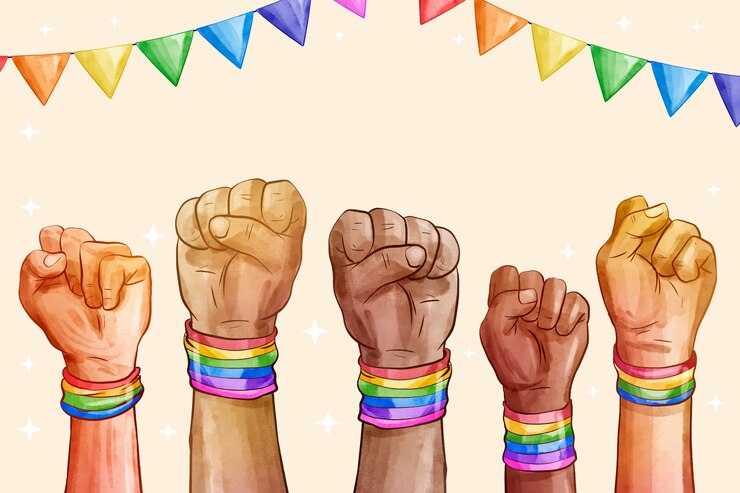The Health and Wellness Tips for Homosexual People

Table of Contents
Understanding Sexual Orientation and Health

Sexual orientation is an integral aspect of human identity and plays a significant role in our overall health and well-being. Understanding the connection between sexual orientation and health is crucial for individuals, healthcare professionals, and society as a whole. Sexual orientation refers to an individual’s enduring pattern of emotional, romantic, and/or sexual attractions to men, women, both genders, or none. It exists on a spectrum, with heterosexuality, homosexuality, and bisexuality being the most commonly recognized orientations.
Research has shown that sexual minority individuals, including those who identify as lesbian, gay, or bisexual, are at a higher risk for several health disparities compared to their heterosexual counterparts. These disparities can include mental health issues such as depression and anxiety, higher rates of substance abuse, increased risk of sexually transmitted infections (STIs), and challenges accessing adequate healthcare. It is essential to recognize and address these disparities to promote the health and well-being of LGBTQ+ individuals.
In order to create a supportive and inclusive healthcare environment, healthcare providers must be knowledgeable about sexual orientation and its impact on health. By understanding the unique healthcare needs and concerns of LGBTQ+ individuals, healthcare professionals can provide comprehensive and affirming care. This includes creating an open and non-judgmental space, using inclusive language, and being aware of the specific health screenings and interventions that may be necessary for this population. It is crucial for healthcare professionals to continually educate themselves and stay updated on LGBTQ+ health research and best practices to ensure the highest quality of care for all patients.
Promoting Mental Health and Well-being for LGBTQ+ Individuals

Mental health and well-being are integral aspects of overall health, and LGBTQ+ individuals face unique challenges that can impact their mental well-being. Discrimination, stigma, and social marginalization can take a toll on emotional and psychological health. In fact, studies have shown that LGBTQ+ individuals are at a higher risk of experiencing mental health disorders such as depression, anxiety, and suicidal ideation compared to their heterosexual and cisgender counterparts (Meyer, 2003; King et al., 2008).
However, there are strategies that can help promote mental health and well-being within the LGBTQ+ community. Creating a supportive and accepting environment, both at an individual and societal level, is crucial. This can involve fostering a sense of belonging and inclusion through education, awareness, and challenging stereotypes and prejudices. Additionally, offering accessible and LGBTQ+-affirming mental health services can provide a safe space for individuals to seek support and treatment when needed. By addressing the unique mental health needs of LGBTQ+ individuals, we can strive towards a future where everyone can thrive and achieve optimal well-being.
Building a Supportive Network for LGBTQ+ Health and Wellness

Building a supportive network for LGBTQ+ health and wellness is essential in promoting overall well-being and reducing health disparities in this community. Creating a sense of belonging and understanding can greatly impact the mental and physical health outcomes for LGBTQ+ individuals. Research has consistently shown that having a supportive network can lead to decreased rates of mental health concerns, such as depression and anxiety, as well as increased access to healthcare services and improved overall quality of life.
One way to build a supportive network is by establishing safe spaces and community organizations that cater specifically to the needs of LGBTQ+ individuals. These spaces not only provide a sense of belonging, acceptance, and support but also offer a platform for sharing experiences, accessing resources, and receiving guidance from peers and professionals. In addition, LGBTQ+ support groups can be beneficial in providing a safe and confidential environment for individuals to discuss personal challenges, seek advice, and develop coping strategies. These networks can also serve as a powerful advocacy tool, collectively striving for equality, access to quality healthcare, and improved healthcare policies for the LGBTQ+ community. By connecting individuals with similar experiences, these networks can help combat isolation and discrimination, ultimately promoting better mental and physical health outcomes for LGBTQ+ individuals.
Navigating Healthcare Systems as an LGBTQ+ Person
Navigating healthcare systems can be a challenge for many individuals, and this is especially true for LGBTQ+ people. As a gynecologist, I understand the importance of providing inclusive and sensitive care to all patients, regardless of their sexual orientation or gender identity. It is crucial for healthcare professionals to create a safe and understanding environment where LGBTQ+ individuals feel comfortable accessing the care they need.
A key aspect of navigating healthcare systems as an LGBTQ+ person is finding healthcare providers who are knowledgeable and experienced in LGBTQ+ health. This can ensure that you receive appropriate and respectful care. One way to find these providers is through LGBTQ+ organizations and networks, which often maintain lists or directories of LGBTQ+ friendly healthcare professionals. Additionally, online resources and forums can provide valuable insights and recommendations from others in the community. When scheduling appointments, it can be helpful to disclose your sexual orientation or gender identity upfront, allowing healthcare providers to be better prepared to address your specific needs. Remember, it is your right to seek out the healthcare that best meets your needs, so feel empowered to advocate for yourself throughout the process.
This table summarizes key aspects of navigating healthcare systems as an LGBTQ+ person:
| Aspect | Description |
|---|---|
| Understanding LGBTQ+ Healthcare Needs | Educate yourself about the unique healthcare needs and disparities experienced by LGBTQ+ individuals. Learn about common health concerns, such as mental health issues, HIV/AIDS, sexually transmitted infections (STIs), hormone therapy, and gender-affirming care, that may disproportionately affect LGBTQ+ people. Understand the barriers to healthcare access, discrimination, and disparities faced by LGBTQ+ individuals in accessing quality, affirming care, and advocate for inclusive healthcare policies and practices that address these needs. |
| Choosing LGBTQ+ Affirming Providers | Seek out healthcare providers who are knowledgeable, affirming, and competent in LGBTQ+ healthcare issues. Research providers and healthcare facilities that specialize in LGBTQ+ care or have a reputation for LGBTQ+ inclusivity and cultural competency. Consider factors such as provider training, experience working with LGBTQ+ patients, and willingness to respect and affirm your gender identity, sexual orientation, and specific healthcare needs. Ask for recommendations from LGBTQ+ community organizations, support groups, or trusted friends and allies who have had positive experiences with LGBTQ+ affirming providers. |
| Communicating Your Identity and Needs | Advocate for yourself by communicating openly and assertively about your LGBTQ+ identity, healthcare needs, and preferences with healthcare providers. Be honest and upfront about your sexual orientation, gender identity, and any specific concerns or healthcare goals you have. Clearly articulate your preferred name, pronouns, and gender identity, and discuss any relevant medical history, hormone therapy, or gender-affirming treatments you are receiving. Provide feedback to providers about their language, behavior, or treatment approaches that affirm or invalidate your identity or experiences, and advocate for respectful, patient-centered care that meets your needs and respects your autonomy. |
| Seeking LGBTQ+ Friendly Facilities | Access healthcare facilities and resources that prioritize LGBTQ+ inclusivity, safety, and respect. Look for LGBTQ+ friendly clinics, hospitals, or healthcare organizations that have policies, practices, and environments conducive to LGBTQ+ patients’ comfort and well-being. Consider factors such as nondiscrimination policies, inclusive intake forms, gender-neutral bathrooms, LGBTQ+ cultural competence training for staff, and visible signs of LGBTQ+ affirmation and visibility in the facility. Advocate for LGBTQ+ friendly spaces and resources within healthcare systems and communities to ensure that LGBTQ+ individuals have equitable access to affirming care and support. |
| Addressing Discrimination and Bias | Speak out against discrimination, bias, and mistreatment encountered within healthcare settings. Advocate for your rights as an LGBTQ+ patient by challenging discriminatory practices, attitudes, or behaviors that undermine your dignity, rights, or access to care. Document instances of discrimination, harassment, or inadequate care and report them to relevant authorities, such as healthcare facility administrators, patient advocacy organizations, or civil rights agencies. Seek support from LGBTQ+ community organizations, legal resources, or allies who can provide guidance, assistance, or advocacy in addressing discrimination and ensuring accountability within healthcare systems. |
| Connecting with LGBTQ+ Support Networks | Build connections with LGBTQ+ support networks, resources, and advocacy organizations that can provide information, support, and solidarity in navigating healthcare systems. Access LGBTQ+ community centers, support groups, online forums, or helplines that offer peer support, information, and referrals for LGBTQ+ healthcare services. Participate in LGBTQ+ health advocacy initiatives, campaigns, or events that promote awareness, education, and policy change to address healthcare disparities and improve access to affirming care for LGBTQ+ individuals. By engaging with LGBTQ+ support networks and resources, you can access valuable support, information, and advocacy to navigate healthcare systems and advocate for your health and well-being as an LGBTQ+ person. |
The Importance of Regular Check-ups and Screenings
Regular check-ups and screenings are essential for maintaining optimal health and well-being, particularly for the LGBTQ+ community. These routine examinations play a crucial role in early detection, prevention, and management of various health conditions. By adopting a proactive approach to healthcare, individuals can better understand their own bodies and take necessary steps to address any emerging health concerns.
One of the key benefits of regular check-ups is the opportunity for healthcare providers to identify potential health risks and offer appropriate interventions. For instance, certain sexually transmitted infections (STIs) can be asymptomatic, making it crucial to undergo regular screenings to detect any infections early on. By doing so, individuals can receive prompt treatment, prevent further complications, and safeguard the sexual health of both themselves and their partners. Additionally, check-ups allow healthcare professionals to assess other important aspects of overall well-being, such as cardiovascular health, mental health, and cancer detection.
Another significant advantage of routine check-ups is the establishment of a strong doctor-patient relationship. These regular visits enable individuals to develop a sense of trust and rapport with their healthcare providers, creating an open environment where they can discuss sensitive topics comfortably. LGBTQ+ individuals, who may face unique healthcare challenges or experience discrimination, can greatly benefit from finding a healthcare professional who is knowledgeable about LGBTQ+ health issues and provides supportive care. Regular check-ups become an avenue for the LGBTQ+ community to receive the specialized care they require, fostering a sense of inclusivity and promoting overall health and wellness.
Managing Stress and Anxiety in LGBTQ+ Communities
Stress and anxiety are common experiences for individuals in the LGBTQ+ communities, often stemming from a variety of sources such as discrimination, stigma, and social isolation. These challenges can have a significant impact on mental health and overall well-being. It is important for individuals to develop effective strategies for managing stress and anxiety to promote a healthier and more fulfilling life.
One approach that has been shown to be beneficial in managing stress and anxiety is seeking social support. Connecting with others who share similar experiences and challenges can provide a sense of belonging and understanding, reducing feelings of isolation. LGBTQ+ community centers, online support groups, and local organizations can be invaluable resources in providing a supportive network for individuals to turn to during difficult times. These spaces not only offer a safe and accepting environment, but they also present opportunities for individuals to share experiences, gain perspectives and insights, and receive encouragement and guidance from others who have gone through similar struggles. By building a supportive network, individuals are more likely to develop healthy coping mechanisms and find strength and resilience in their collective experiences.
Promoting Healthy Relationships and Communication
Building and maintaining healthy relationships is essential for overall well-being, especially within the LGBTQ+ community. Effective communication is the foundation of any successful relationship, allowing individuals to express their needs, desires, and concerns openly and honestly. However, it is not always easy to navigate the complexities of relationships, particularly when facing unique challenges associated with sexual orientation and gender identity.
One key aspect of promoting healthy relationships is cultivating empathy and understanding. This involves recognizing and accepting the diverse experiences and perspectives within the LGBTQ+ community. By actively listening to and validating each other’s feelings and experiences, individuals can create a safe and supportive space for open communication. Additionally, it is crucial to prioritize consent and boundaries, ensuring that all parties feel respected and empowered within the relationship. These principles are essential in fostering trust, deepening emotional connections, and promoting overall relationship satisfaction.
In conclusion, promoting healthy relationships and effective communication is vital for the well-being of LGBTQ+ individuals. By embracing empathy, understanding, and respect, individuals can build strong and supportive connections. It is important to remember that every relationship is unique, and what works for one couple may differ for another. Seeking professional guidance, such as couples therapy or LGBTQ+-specific relationship resources, can also be beneficial in navigating challenges and fostering healthy, fulfilling relationships.
Addressing Substance Abuse and Addiction in LGBTQ+ Communities
Substance abuse and addiction can have a profound impact on the well-being of LGBTQ+ communities. Research has consistently shown that individuals who identify as LGBTQ+ are more likely to engage in substance use and have higher rates of substance abuse disorder compared to their heterosexual counterparts. This disparity can be attributed to various factors, including societal stigma, discrimination, and unique stressors faced by LGBTQ+ individuals.
According to a national survey conducted by the Substance Abuse and Mental Health Services Administration (SAMHSA), sexual minority adults are more than twice as likely to have a substance use disorder compared to individuals who identify as heterosexual. This highlights the urgent need for targeted interventions and support services to address substance abuse and addiction within LGBTQ+ communities.
Stigma and discrimination experienced by LGBTQ+ individuals can contribute to feelings of isolation, low self-esteem, and a lack of social support. These factors can increase the risk of turning to substance use as a coping mechanism. Moreover, the prevalence of mental health issues, such as anxiety and depression, within the LGBTQ+ community can further exacerbate substance abuse and addiction.
To effectively address substance abuse and addiction in LGBTQ+ communities, it is crucial to adopt a comprehensive and inclusive approach. This includes providing culturally competent and affirming treatment and prevention programs that acknowledge the unique challenges faced by LGBTQ+ individuals. Additionally, creating safe and supportive spaces that foster healthy coping mechanisms, resilience, and connection can play a significant role in preventing and addressing substance abuse within these communities.
It is important to recognize that substance abuse and addiction are complex problems that require a multifaceted response. By combining evidence-based interventions, community support, and efforts to reduce stigma, we can work towards creating a healthier and more inclusive future for everyone in the LGBTQ+ community. Through awareness, education, and compassionate care, we can empower individuals to overcome addiction and reclaim their health and well-being.
Exploring Safe and Consensual Sexual Practices
When it comes to exploring safe and consensual sexual practices, knowledge and communication are key. Understanding your own boundaries and desires, as well as those of your partner, can help ensure a positive and fulfilling experience. Consent, which is a voluntary, enthusiastic, and ongoing agreement to engage in sexual activity, should always be the foundation of any sexual encounter.
It is crucial to have open and honest conversations with your partner(s) about your boundaries, preferences, and comfort levels. These discussions can help establish trust and mutual understanding, allowing you both to explore intimacy in a way that feels safe and consensual. Remember, consent should be given freely and can be withdrawn at any point during a sexual activity. It is important to respect and honor any boundaries or requests for stopping or slowing down.
Additionally, practicing safe sex is essential for sexual health. Using condoms, dental dams, or other barrier methods can help reduce the risk of sexually transmitted infections (STIs) and unintended pregnancies. It is also advisable to get regularly tested for STIs, especially if you have multiple partners or engage in high-risk sexual behaviors. STIs can often be asymptomatic, meaning they may not show any symptoms, so regular testing is an important preventive measure. By prioritizing communication, consent, and safe sex practices, individuals can create a positive and healthy sexual experience for themselves and their partners.
Understanding the Risks and Prevention of Sexually Transmitted Infections
Sexually transmitted infections (STIs) are a common concern for individuals of all sexual orientations and gender identities. Being informed about the risks and prevention strategies is key to maintaining sexual health and well-being. By understanding the importance of safe sexual practices and taking proactive measures, we can reduce the transmission and impact of STIs in LGBTQ+ communities.
It is crucial to remember that regardless of sexual orientation or gender identity, anyone who engages in sexual activity can be at risk for contracting STIs. Therefore, practicing safe sex is essential for everyone. This includes the consistent and correct use of barriers, such as condoms or dental dams, during oral, anal, and vaginal sex. Utilizing barriers can significantly reduce the risk of STI transmission, as they act as a physical barrier between bodily fluids. Additionally, regular testing and open communication with sexual partners are vital aspects of prevention. Regular testing allows for early detection and treatment if necessary, minimizing potential complications and the spread of infections.
Promoting Healthy Body Image and Self-esteem
Body image and self-esteem play crucial roles in our overall well-being and mental health. For individuals in the LGBTQ+ community, navigating societal pressures and stereotypes can further complicate these issues. It is important to create an environment that promotes acceptance and champions diverse body types and identities.
Research has shown that LGBTQ+ individuals may experience higher rates of body dissatisfaction and disordered eating behaviors compared to their heterosexual counterparts. This can be attributed to factors such as internalized homophobia, discrimination, and the pressure to conform to societal beauty standards. It is essential to address these issues and promote a positive body image and self-esteem within the community.
One effective strategy is to foster a culture of inclusivity that celebrates body diversity. Emphasizing that all bodies are unique and valid, regardless of shape, size, or gender expression, can help individuals feel more comfortable and confident in their own skin. Additionally, promoting self-care practices that prioritize mental and physical well-being, such as engaging in regular physical activity and seeking therapy or counseling if needed, can contribute to a healthier body image and self-esteem. It is also important to provide support and resources for those who may be struggling with body image issues, such as connecting them with body-positive communities, professional help, or support groups. Together, we can create a society that values and uplifts all individuals, fostering a positive body image and self-esteem for everyone in the LGBTQ+ community.
Coping with Discrimination and Homophobia
Coping with Discrimination and Homophobia
Dealing with discrimination and homophobia can be incredibly challenging and have significant impacts on the mental and emotional well-being of LGBTQ+ individuals. It is important to acknowledge and address these issues in order to promote a healthier and more inclusive society.
One way to cope with discrimination and homophobia is to build a strong support network. Connecting with friends, family members, or support groups who understand and validate your experiences can provide a sense of belonging and support during difficult times. Surrounding yourself with people who affirm your identity and provide a safe space can help combat feelings of isolation and shame. Additionally, seeking professional help from therapists or counselors who specialize in LGBTQ+ issues can provide valuable guidance and support in navigating these challenging situations. Remember, reaching out for help is a sign of strength, not weakness.
Advocating for LGBTQ+ Rights and Access to Quality Healthcare
Access to quality healthcare is a fundamental right for every individual, regardless of their sexual orientation or gender identity. LGBTQ+ individuals often face unique barriers when seeking healthcare, such as discrimination, lack of culturally competent providers, and limited access to inclusive healthcare services. Advocating for LGBTQ+ rights and access to quality healthcare is crucial to ensure their overall health and well-being.
Numerous studies have shown that LGBTQ+ individuals experience health disparities compared to their heterosexual and cisgender counterparts. According to a report by the National Institutes of Health, LGBTQ+ individuals are more likely to experience mental health issues, substance abuse, and higher rates of certain cancers. These disparities can be attributed to the lack of comprehensive and tailored healthcare services that address the specific needs of LGBTQ+ individuals. By advocating for LGBTQ+ rights and access to quality healthcare, we can work towards bridging these gaps and promoting equitable healthcare for all.
Cultivating a Healthy Lifestyle through Nutrition and Exercise
A healthy lifestyle encompasses various aspects, including nutrition and exercise, which play a crucial role in promoting overall well-being. When it comes to cultivating a healthy lifestyle, it is essential to understand the impact that proper nutrition can have on our bodies. A well-balanced diet, rich in nutrients, can provide us with the necessary energy, support our immune system, and reduce the risk of chronic diseases such as obesity, diabetes, and heart disease.
It is recommended to focus on consuming a diverse range of foods, including fruits, vegetables, whole grains, lean proteins, and healthy fats. These food groups offer a wide variety of essential vitamins, minerals, and antioxidants our bodies need to function optimally. Moreover, incorporating regular exercise into our daily routine can significantly enhance the benefits of a nutritious diet. From reducing the risk of cardiovascular disease and improving mental health to promoting weight management and boosting energy levels, regular physical activity is vital for our overall health. Engaging in activities such as walking, jogging, cycling, swimming, or strength training can lead to numerous physiological and psychological benefits, contributing to a healthier and more fulfilling life.
Cultivating a healthy lifestyle through nutrition and exercise requires commitment and consistency. However, it is crucial to customize our approach based on our individual needs and preferences. Consulting with a healthcare professional, such as a registered dietitian or a certified personal trainer, can provide valuable guidance tailored to our specific goals and circumstances. By integrating nutritious food choices and regular exercise into our daily lives, we can optimize our well-being and enhance our quality of life.
Resources and Support for LGBTQ+ Health and Wellness.
LGBTQ+ individuals often face unique challenges when it comes to accessing healthcare and finding resources that cater to their specific needs. However, there are numerous organizations and support systems available that aim to provide the necessary resources and support for LGBTQ+ health and wellness.
One such organization is the National LGBT Health Education Center, which offers a wealth of information and resources for healthcare providers, patients, and community members. They offer online training programs, webinars, and educational resources to help healthcare professionals better understand and address the specific healthcare needs of LGBTQ+ individuals. Additionally, they provide guidance on creating inclusive and welcoming environments within healthcare settings, ensuring that LGBTQ+ patients feel valued and respected.
The Trevor Project is another invaluable resource for LGBTQ+ individuals, particularly for those in need of mental health support. They provide a 24/7 crisis intervention and suicide prevention helpline specifically for LGBTQ+ youth, staffed by trained counselors who understand the unique struggles faced by this community. The Trevor Project also offers online chat and text services, as well as a range of educational resources and support networks, empowering LGBTQ+ individuals to prioritize their mental health and well-being.
These are just a few examples of the many resources and support systems available for LGBTQ+ individuals seeking to improve their health and wellness. The key is to reach out and take advantage of these organizations, recognizing that there are professionals and community members who are dedicated to providing the care and support that LGBTQ+ individuals deserve.
What are some common health disparities faced by LGBTQ+ individuals?
LGBTQ+ individuals often face higher rates of mental health issues, substance abuse, and sexually transmitted infections compared to the general population. They may also experience barriers to accessing healthcare and face discrimination and stigma, which can negatively impact their overall health and well-being.
How can LGBTQ+ individuals find supportive healthcare providers?
LGBTQ+ individuals can seek out healthcare providers who are knowledgeable and supportive of their specific needs by researching LGBTQ+-friendly clinics, asking for referrals from LGBTQ+ community organizations, or reaching out to LGBTQ+ health advocacy groups for recommendations.
Are there any specific healthcare screenings or check-ups that LGBTQ+ individuals should prioritize?
Yes, LGBTQ+ individuals should prioritize regular screenings for sexually transmitted infections, including HIV, as well as routine check-ups for mental health concerns. It is also important to have regular screenings for cancer, such as breast, cervical, and anal cancer, based on individual risk factors.
How can LGBTQ+ individuals cope with discrimination and homophobia?
Coping with discrimination and homophobia can be challenging, but seeking support from friends, family, or LGBTQ+ support groups can be helpful. Engaging in self-care activities, such as therapy or mindfulness practices, can also aid in managing the emotional impact of discrimination and homophobia.
What resources are available for LGBTQ+ individuals struggling with substance abuse?
There are several resources available for LGBTQ+ individuals struggling with substance abuse, such as LGBTQ+-specific recovery support groups, helplines, and treatment centers that provide inclusive and understanding care. LGBTQ+ community centers and organizations may also offer support and resources in this area.
How can LGBTQ+ individuals advocate for their rights and access to quality healthcare?
LGBTQ+ individuals can advocate for their rights and access to quality healthcare by getting involved in local LGBTQ+ organizations, participating in advocacy campaigns, contacting elected officials, and sharing their personal stories to raise awareness about the challenges they face in accessing healthcare.
What are some tips for cultivating a healthy lifestyle through nutrition and exercise for LGBTQ+ individuals?
LGBTQ+ individuals can cultivate a healthy lifestyle through nutrition and exercise by focusing on a balanced diet that includes a variety of fruits, vegetables, whole grains, and lean proteins. Regular exercise, such as engaging in physical activities that they enjoy, can also contribute to overall health and well-being.
Are there any specific safe sexual practices that LGBTQ+ individuals should be aware of?
LGBTQ+ individuals should be aware of safe sexual practices, such as using barrier methods (condoms, dental dams) during sexual activities that involve genital contact or oral sex, and regularly getting tested for sexually transmitted infections.
Where can LGBTQ+ individuals find resources and support for their health and wellness needs?
LGBTQ+ individuals can find resources and support for their health and wellness needs through LGBTQ+ community centers, local LGBTQ+-friendly clinics, national LGBTQ+ health organizations, online forums, and helplines specifically designed for LGBTQ+ individuals.






